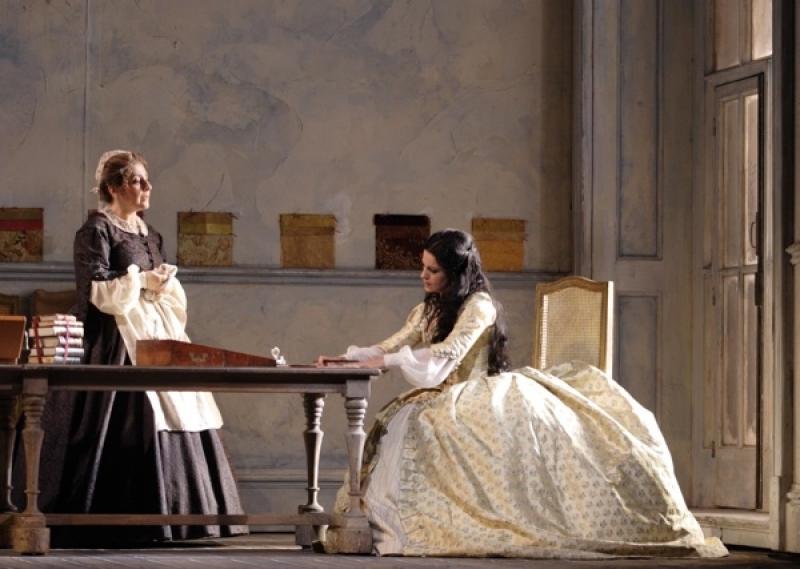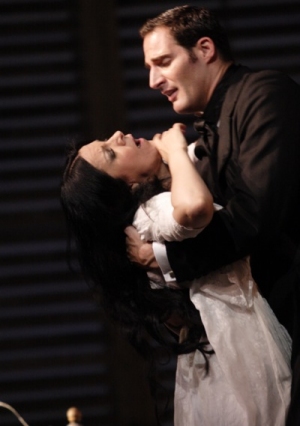La Traviata, Royal Opera | reviews, news & interviews
La Traviata, Royal Opera
La Traviata, Royal Opera
It may be Gheorghiu's Ceausescu childhood, but her Violetta is extraordinary

Of course she isn't now the watchful, learning 29-year-old who premiered Covent Garden’s opulent, sensually loaded production in 1995, but Gheorghiu’s varicoloured voice - a rainbow of tears, sobs, scoops, warbling runs and top notes that seem to rack her body with pain - has if anything added more colours since then (including a less fetching
Sir Richard took a curtain call last night, and I wondered if he coached Gheorghiu in her febrile little gestures - the vulgar way she wiped her lips when she was kissed was one that caught my eye, and the way in “Sempre libera” she plucked at her gorgeous dress in something like disgust, the hint that Violetta, under her scintillating appearance, is used to quick changes of underwear. A great Violetta has a voice to register all those myriad collisions of fact and feeling, a voice etched with fragilities and secret worries, plus the iron technical strength to wring every last drop of pathos from all those textures, and for me it's Ileana Cotrubas, Callas of course, and Gheorghiu who stand out far from the armies of more golden, rational sopranos. But her absorption in her own beauty has made the Romanian more calculating as an actress than the other two, and last night I frequently found myself shutting my eyes to close off her more-is-more school of eyebrow-dancing, and just soaking in that addictive, succulent voice which can be so affectingly sincere. And her timing is interesting too, wilful, even jazzy here and there in Act Two - giving the responsive Yves Abel in the pit quite a runaround in places - yet it's not theatrically uncreative. Her duet with the reproving father, Zelko Lucic, was sensational last night; he standing stolid and as full of male clichés as a Provençal wine-merchant, she the reckless young Parisienne with too little control over her emotions. The wardrobe-shaped Lucic may not look remotely genetically related to Valenti, but he gave a fine, reticent portrayal of a slowly melting Germont, despite not being much in tune with Eyre’s naturalistic acting requirements. Good sounds and playing from Changhan Lim and Kai Rüütel, two Jette Parker Young Artists at the ROH, as Flora Bervoix and her patron, and Sarah Pring made an unusually impactful acting part of Annina, Violetta’s maid. Abel kept the evening well-sprung and swift on its toes from the pit, and made some great moments with Gheorghiu: in the juddering, heart-pounding pulse that he set for the dazed finale of Act Two, and in the last act, where the thread of sound that came from her throat alongside the sweet, lonely heedlessness of the violin sounds, as thin and wavering as a candle flame, the gentle valedictory of “Addio del passato”, the gruff grunts of the horns under her dying song, “Se una pudica virgine”, made the tragedy as piercing as it could be. I’m afraid I was in floods. Whether it’s Gheorghiu’s history as a Ceausescu child in a benighted Romania, she does drive the callousness of Violetta’s story with a devastating emotional power, and it may be why her incarnation of Richard Eyre’s production and Bob Crowley’s almost fascistic set still feels so right 15 years later. The world Eyre and Crowley create is super-glamorous, it’s magnetic, it’s empty, it’s an auction-house awaiting a prize object. That golden bowl of a salon at her place, that swirling, vertiginous red cardroom at Flora Bervoix’s, these are places built for males to admire and buy women in, and the tricksier she is the higher her price. (pictured above, Gheorghiu in Act 1)
Whether it’s Gheorghiu’s history as a Ceausescu child in a benighted Romania, she does drive the callousness of Violetta’s story with a devastating emotional power, and it may be why her incarnation of Richard Eyre’s production and Bob Crowley’s almost fascistic set still feels so right 15 years later. The world Eyre and Crowley create is super-glamorous, it’s magnetic, it’s empty, it’s an auction-house awaiting a prize object. That golden bowl of a salon at her place, that swirling, vertiginous red cardroom at Flora Bervoix’s, these are places built for males to admire and buy women in, and the tricksier she is the higher her price. (pictured above, Gheorghiu in Act 1) Still, there is also attention to be paid to her tenor, making his Covent Garden debut a few months after his Metropolitan Opera debut in this role, and with a big US singing prize under his belt that tells us that James Valenti, at 32, is being set up for a major career (pictured right with Gheorghiu in Act 3). He certainly stands out. For one thing he is 6ft 5in tall, and has a beaky modern face, like Christopher Ecclestone, quite priestly, and for another, this very unItalian-looking person possesses a warm, high and full tenor voice of genuine beauty and distinction, which he delivers with a nice sincerity, if not yet quite the full Italian striker emotional kit. Nerves must have played their part in sandbagging the final outcome of his Act Two double-whammy “De miei bollenti spiriti... O, mio rimorso! O, infamia!" after an excellent start. There is obviously an outstanding voice in the making here, though it's early days, and I'm not sure Verdi is his natural emploi unless he gets sharper Italian pronunciation and some welly in his ornaments and top notes.
Still, there is also attention to be paid to her tenor, making his Covent Garden debut a few months after his Metropolitan Opera debut in this role, and with a big US singing prize under his belt that tells us that James Valenti, at 32, is being set up for a major career (pictured right with Gheorghiu in Act 3). He certainly stands out. For one thing he is 6ft 5in tall, and has a beaky modern face, like Christopher Ecclestone, quite priestly, and for another, this very unItalian-looking person possesses a warm, high and full tenor voice of genuine beauty and distinction, which he delivers with a nice sincerity, if not yet quite the full Italian striker emotional kit. Nerves must have played their part in sandbagging the final outcome of his Act Two double-whammy “De miei bollenti spiriti... O, mio rimorso! O, infamia!" after an excellent start. There is obviously an outstanding voice in the making here, though it's early days, and I'm not sure Verdi is his natural emploi unless he gets sharper Italian pronunciation and some welly in his ornaments and top notes.
Add comment
The future of Arts Journalism
You can stop theartsdesk.com closing!
We urgently need financing to survive. Our fundraising drive has thus far raised £49,000 but we need to reach £100,000 or we will be forced to close. Please contribute here: https://gofund.me/c3f6033d
And if you can forward this information to anyone who might assist, we’d be grateful.

Subscribe to theartsdesk.com
Thank you for continuing to read our work on theartsdesk.com. For unlimited access to every article in its entirety, including our archive of more than 15,000 pieces, we're asking for £5 per month or £40 per year. We feel it's a very good deal, and hope you do too.
To take a subscription now simply click here.
And if you're looking for that extra gift for a friend or family member, why not treat them to a theartsdesk.com gift subscription?
more Opera
 La bohème, Opera North review - still young at 32
Love and separation, ecstasy and heartbreak, in masterfully updated Puccini
La bohème, Opera North review - still young at 32
Love and separation, ecstasy and heartbreak, in masterfully updated Puccini
 Albert Herring, English National Opera review - a great comedy with depths fully realised
Britten’s delight was never made for the Coliseum, but it works on its first outing there
Albert Herring, English National Opera review - a great comedy with depths fully realised
Britten’s delight was never made for the Coliseum, but it works on its first outing there
 Carmen, English National Opera review - not quite dangerous
Hopes for Niamh O’Sullivan only partly fulfilled, though much good singing throughout
Carmen, English National Opera review - not quite dangerous
Hopes for Niamh O’Sullivan only partly fulfilled, though much good singing throughout
 Giustino, Linbury Theatre review - a stylish account of a slight opera
Gods, mortals and monsters do battle in Handel's charming drama
Giustino, Linbury Theatre review - a stylish account of a slight opera
Gods, mortals and monsters do battle in Handel's charming drama
 Susanna, Opera North review - hybrid staging of a Handel oratorio
Dance and signing complement outstanding singing in a story of virtue rewarded
Susanna, Opera North review - hybrid staging of a Handel oratorio
Dance and signing complement outstanding singing in a story of virtue rewarded
 Ariodante, Opéra Garnier, Paris review - a blast of Baroque beauty
A near-perfect night at the opera
Ariodante, Opéra Garnier, Paris review - a blast of Baroque beauty
A near-perfect night at the opera
 Cinderella/La Cenerentola, English National Opera review - the truth behind the tinsel
Appealing performances cut through hyperactive stagecraft
Cinderella/La Cenerentola, English National Opera review - the truth behind the tinsel
Appealing performances cut through hyperactive stagecraft
 Tosca, Royal Opera review - Ailyn Pérez steps in as the most vivid of divas
Jakub Hrůša’s multicoloured Puccini last night found a soprano to match
Tosca, Royal Opera review - Ailyn Pérez steps in as the most vivid of divas
Jakub Hrůša’s multicoloured Puccini last night found a soprano to match
 Tosca, Welsh National Opera review - a great company reduced to brilliance
The old warhorse made special by the basics
Tosca, Welsh National Opera review - a great company reduced to brilliance
The old warhorse made special by the basics
 BBC Proms: The Marriage of Figaro, Glyndebourne Festival review - merriment and menace
Strong Proms transfer for a robust and affecting show
BBC Proms: The Marriage of Figaro, Glyndebourne Festival review - merriment and menace
Strong Proms transfer for a robust and affecting show
 BBC Proms: Suor Angelica, LSO, Pappano review - earthly passion, heavenly grief
A Sister to remember blesses Puccini's convent tragedy
BBC Proms: Suor Angelica, LSO, Pappano review - earthly passion, heavenly grief
A Sister to remember blesses Puccini's convent tragedy
 Orpheus and Eurydice, Opera Queensland/SCO, Edinburgh International Festival 2025 review - dazzling, but distracting
Eye-popping acrobatics don’t always assist in Gluck’s quest for operatic truth
Orpheus and Eurydice, Opera Queensland/SCO, Edinburgh International Festival 2025 review - dazzling, but distracting
Eye-popping acrobatics don’t always assist in Gluck’s quest for operatic truth

Comments
...
...
...
...